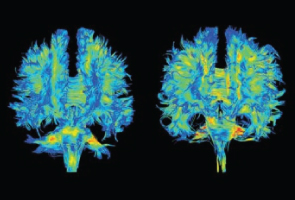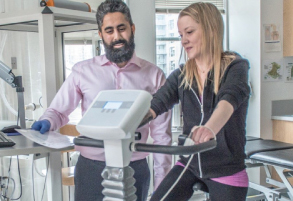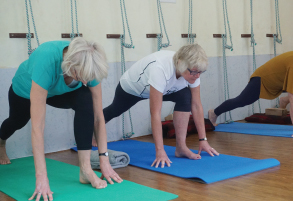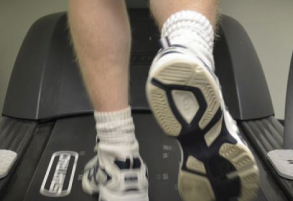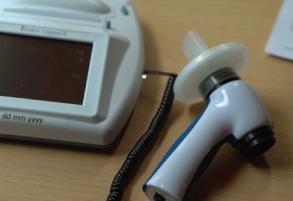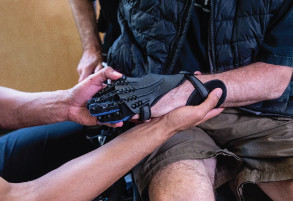Emerging strength in cardiopulmonary function and musculoskeletal disorders round out the core pillars of excellence within the department. Faculty expertise also includes interprofessional practice and teaching as well as exercise and lifestyle effects on people with chronic conditions.
Together, with our established expertise in Neurologic rehabilitation, the department is well-positioned to confront the highly competitive research environment.
Aging, Mobility and Cognitive Neuroscience
(PI – Liu-Ambrose)
A promising and relatively inexpensive approach to promote healthy ageing and functional independence is exercise. The research conducted at the Aging, Mobility and Cognitive Health Laboratory will directly contribute to validating exercise as an approach to minimize the impact of cognitive impairment and dementia while optimizing physical function, mobility, and functional independence in older adults.

Arthritis, Joint Health & Knowledge Translation Research Program
(PI – Linda Li)
Located at Arthritis Research Canada (Vancouver, BC), this research program uniquely focuses on the science of mobilising research evidence and supporting its use in real life. We study approaches to improve the delivery of physical activity interventions for people with complex chronic conditions, and strategies to implement effective interventions (e.g., patient decision aids) to promote shared decision making.
Brain Behaviour Laboratory
(PI – Lara Boyd)
The Brain Behaviour Lab (BBL) conducts research integrating two fields of study: neurobiology of motor learning and neural science of stroke recovery. Through a combination of motor testing, cognitive testing, and neural imaging we are able to examine how the human brain recovers from various types of injury and illness.
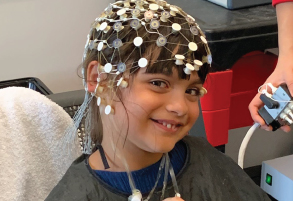
Brain Development: Perception to Action
(PI – Naznin Virji-Babul)
The Perception-Action Lab is directed at understanding the neural correlates underlying perceptual-motor and social-emotional processing in typical infant and child development, atypical development and in adolescents and adults with concussion/mild traumatic brain injury.
Cardiopulmonary Exercise Physiology Laboratory
(PI – Jordan Guenette)
The Cardiopulmonary Exercise Physiology (CPEP) Laboratory studies the physiological mechanisms and management of breathlessness and exercise intolerance in healthy individuals and in those with chronic cardiorespiratory diseases.
Cancer Exercise & Physiotherapy Lab
(PI – Kristin Campbell)
The Cancer Exercise & Physiotherapy Lab undertakes research to understand the role of exercise in reducing the risk of cancer, and the role of physical therapy and exercise to improve the physical function, quality of life and survival of cancer survivors.
Motion Analysis and Biofeedback Laboratory
(PI – Michael Hunt)
The Motion Analysis and Biofeedback Laboratory is dedicated to furthering the understanding of the role of muscle and joint biomechanics in the pathogenesis of injury and disease.
Pulmonary Rehabilitation Research Laboratory
(PI – Pat Camp)
The Pulmonary Rehabilitation Research Laboratory conducts high-impact epidemiological, health services, and clinical research to improve health outcomes for individuals with chronic lung disease.
Rehabilitation Research Program at G.F. Strong Rehab Centre
(PI – Janice Eng)
The Neurorehabilitation Research Program is directed by Dr Janice Eng. Her research is located at the Rehabilitation Research Program (RRP), GF Strong Rehab Centre. GF Strong Rehab Centre is the largest rehabilitation centre in British Columbia with clinical programs in stroke, traumatic brain injury, spinal cord injury and arthritis. The RRP is an interdisciplinary research centre with 10 faculty and over 40 trainees. RRP faculty work closely with GF Strong Rehab Centre clinicians and patients to discover innovative solutions to optimize the outcomes of rehabilitation and improve the lives of those with disabilities and their families. Dr Eng’s research develops novel rehabilitation interventions to improve important aspects of functioning and the health of individuals with neurological conditions. Research studies range from exploratory mechanistic studies to clinical trials and knowledge translation.
Tendon Injury Prevention and Rehabilitation
(PI – Alex Scott)
The goal of this research group is to understand the influence of movement on tendon biology and to incorporate this knowledge into new clinical strategies for tendinopathy. New treatments currently being examined include movement-based therapies, physical therapy modalities, and novel drug strategies.

Musculoskeletal Rehabilitation
(PI – Jackie Whittaker)
Dr. Whittaker’s research focuses on preventing chronic musculoskeletal conditions, with a particular emphasis on knee osteoarthritis resulting from youth traumatic sports-related injuries. Her work aims to improve patient outcomes through; 1) understanding the consequences of youth sport-related knee injuries, 2) optimizing healthcare pathways for youth that suffer a knee injury, 3) developing and evaluating interventions to reduce the risk of osteoarthritis after a knee injury and, 4) optimizing function in persons that develop knee osteoarthritis prematurely as a result of an injury.
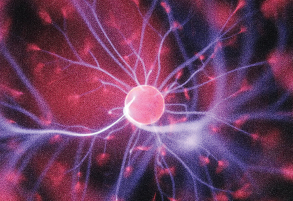
GF Strong Rehabilitation Centre
(PI – Courtney Pollock)
Dr. Pollock’s lab is located at GF Strong Rehabilitation Centre. She is accepting students interested in pursuing MSc and PhD degrees through the UBC Rehabilitation Sciences Graduate Program. Work in the Mobility and Balance Rehabilitation Lab will immerse students in a highly collaborative research environment addressing questions related to fundamental motor control of balance and clinically driven questions addressing balance impairment and mobility.
Lab Name TBD
Taru Manyanga
Expertise: Assessment of movement behaviors and health indicators (e.g., body composition) in healthy or clinical populations among children and adolescents; role of physical activity in the prevention and management of chronic diseases across the life-course; assessing and comparing movement in behaviors in various settings (e.g.) rural/remote vs. urban or local vs international settings; understanding barriers and facilitators to physical activity in different contexts
In addition, faculty members and their research programs are well integrated with several of the world-class research facilities established here in BC including:
International Collaboration on Repair Discoveries (ICORD)
Centre for Heart Lung Innovation

